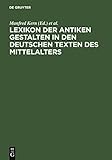Lexikon der antiken Gestalten in den deutschen Texten des Mittelalters / hrsg. von Manfred Kern, Alfred Ebenbauer.
Material type: TextPublisher: Berlin ; Boston : De Gruyter, [2012]Copyright date: ©2003Description: 1 online resource (722 p.)Content type:
TextPublisher: Berlin ; Boston : De Gruyter, [2012]Copyright date: ©2003Description: 1 online resource (722 p.)Content type: - 9783110162578
- 9783110897326
- Civilization, Classical, in literature -- Dictionaries
- German literature -- Middle High German, 1050-1500 -- Classical influences
- Mythology, Classical, in literature -- Dictionaries
- Literarischer Stoff
- Literaturwissenschaft / Allgemeines, Lexika
- Mythologie
- Rezeption (Literatur)
- LITERARY CRITICISM / European / German
- 830.9 23
- PT191 .L49 2003eb
- online - DeGruyter
- Issued also in print.
| Item type | Current library | Call number | URL | Status | Notes | Barcode | |
|---|---|---|---|---|---|---|---|
 eBook
eBook
|
Biblioteca "Angelicum" Pont. Univ. S.Tommaso d'Aquino Nuvola online | online - DeGruyter (Browse shelf(Opens below)) | Online access | Not for loan (Accesso limitato) | Accesso per gli utenti autorizzati / Access for authorized users | (dgr)9783110897326 |
Browsing Biblioteca "Angelicum" Pont. Univ. S.Tommaso d'Aquino shelves, Shelving location: Nuvola online Close shelf browser (Hides shelf browser)
i-iv -- Vorwort -- Inhalt -- Einführung in Gegenstand und Konzeption -- I. Antikerezeption im Mittelalter und in der deutschen Literatur – Ziele und Ergebnisse des Lexikons -- II. Hinweise zur Benutzung -- III. Abkürzungen, Quellen, Forschungsliteratur -- Artikel A-Z -- A -- Β -- C -- D -- Ε -- F -- G -- Η -- I -- L -- Μ -- Ν -- O -- Ρ -- Q -- R -- S -- T -- U -- V -- X -- Z -- Register -- Register der Einträge nach Autoren und Werken -- Register der Namensvarianten -- Register der Artikel
restricted access online access with authorization star
http://purl.org/coar/access_right/c_16ec
Die Auseinandersetzung mit der Antike hat die mittelalterliche Geistesgeschichte wesentlich bestimmt. Antike Stoffe und Texte leisteten einen entscheidenden Beitrag zur Entstehung des volkssprachlichen Romans. Die antike Mythologie ist in einer breiten Tradition von Exempla und Vergleichen das ganze Mittelalter hindurch präsent. Das Lexikon der antiken Gestalten in den deutschen Texten des Mittelalters gibt nun in Form eines Namenlexikons erstmals einen systematischen Überblick über die Antikerezeption des deutschen Hochmittelalters. Verzeichnet sind alle Gestalten aus antiker Mythologie und Geschichte, die in der weltlichen, geistlichen und historiographischen Literatur von ca. 1100-1350 belegt sind. Die Artikel gliedern sich in einen Belegteil mit Angaben zum Inhalt und in einen Kommentarteil, der Grundlinien und Brüche in der Rezeption sowie Verbindungen zur Antikerezeption der mittellateinischen und romanischen Literatur darstellt. Eine ausführliche Bibliographie und mehrere Indices komplettieren das umfassende Nachschlagewerk.
The occupation with Classical Antiquity had a seminal influence on the medieval history of ideas. Classical themes, motifs and texts played a decisive role in the development of the vernacular novel. Classical mythology is constantly present throughout the Middle Ages in a broad tradition of exemplars and comparisons. The Lexikon der antiken Gestalten is structured as a dictionary of names, and for the first time gives a systematic overview of the reception of Classical Antiquity in the German High Middle Ages. It registers all the characters from classical mythology and history which occur in secular, sacred and historiographic literature from approx. 1100-1350. The articles are divided into a documentation section with information on the contents, and a commentary, which presents the base-lines and fault lines in the reception, together with links to the reception of Classical Antiquity in Medieval Latin and Romance literature. This comprehensive reference work is completed with an exhaustive bibliography and several indexes.
Issued also in print.
Mode of access: Internet via World Wide Web.
In German.
Description based on online resource; title from PDF title page (publisher's Web site, viewed 29. Jun 2022)









